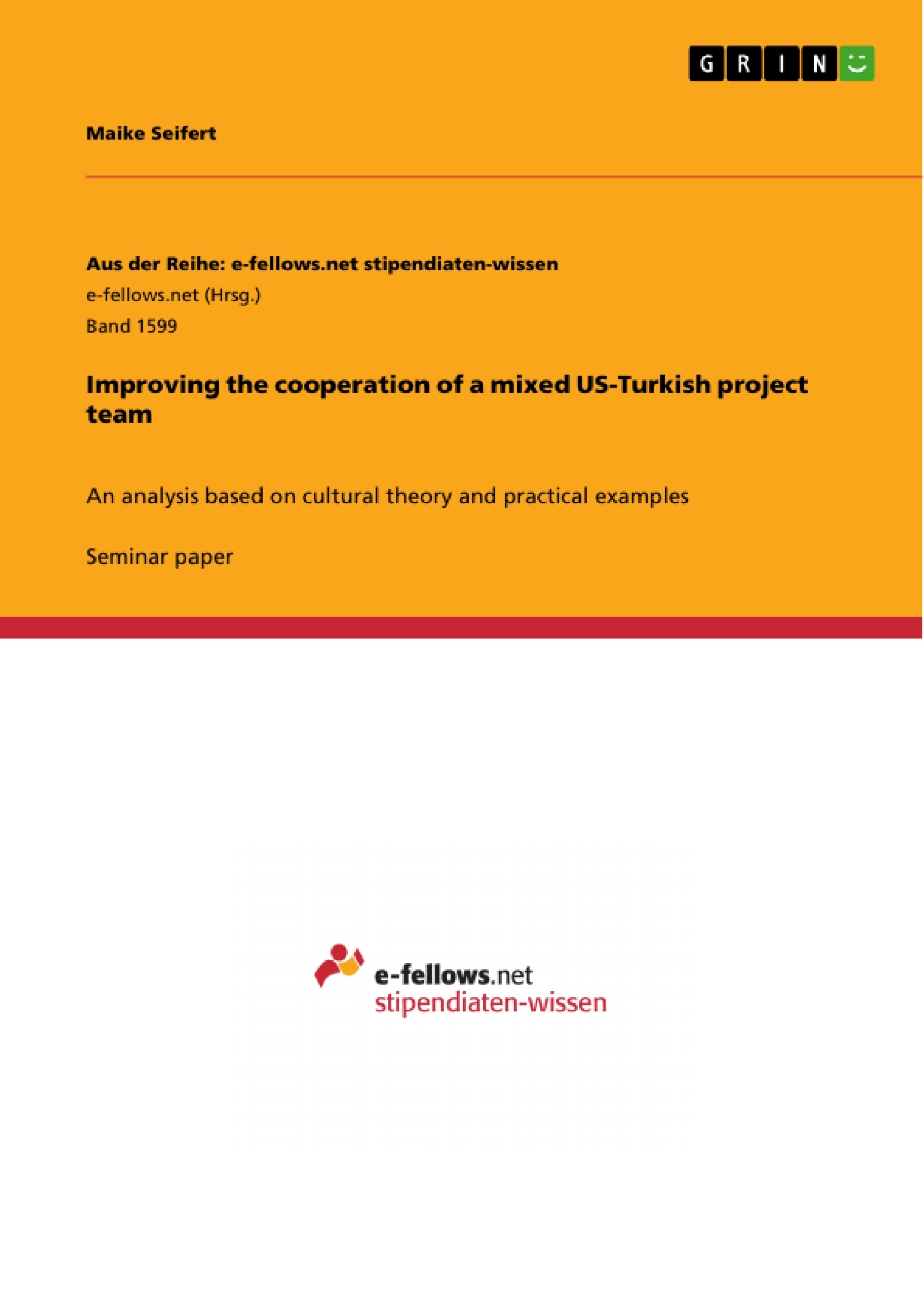In times of globalization, countries all over the world have transformed to an interdependent economic system. Especially rising economic powers, such as Turkey, and the largest economic powers in the world, like the USA, face an increasing collaboration due to their economic importance to each other.
The aim of this paper is the improvement of the cooperation of a mixed US-Turkish team by giving the reader an understanding about these two apparently very different countries.
In order to understand the foundation of a cultural comparison a definition of culture is given. Then, some general information about the countries is provided. After explaining Hofstede’s cultural theory the Turkish and US American culture are analyzed according to three of Hofstede’s dimensions. Due to the scope of this paper and because of the aim of giving not only surface information it focuses on the dimensions ‘Power distance’, ‘Long-term orientation’ and ‘Individualism vs. Collectivism’ which are most important to a project team. These dimensions show not only differences but also similarities as a common base. Personal experiences and quotes from scientific literature underline the differences or equalities.
Inhaltsverzeichnis (Table of Contents)
- 1 Introduction
- 2 Definition of culture
- 3 General information about the USA and Turkey
- 4 Hofstede's cultural theory
- 5 Analysis of the Turkish and US American culture
- 5.1 Power Distance
- 5.2 Long-term Orientation
- 5.3 Individualism vs. Collectivism
- 6 Conclusion
Zielsetzung und Themenschwerpunkte (Objectives and Key Themes)
This paper aims to improve the cooperation of a mixed US-Turkish project team by providing an understanding of these two seemingly different countries. The paper utilizes cultural theories, particularly focusing on Geert Hofstede’s framework, to gain insight into the cultural nuances of both nations.
- Cultural Differences in US and Turkish Project Teams
- Impact of Cultural Understanding on Collaboration
- Application of Cultural Theories to Practical Scenarios
- Importance of Recognizing Surface vs. Deep Cultural Dimensions
- Strategies for Effective Cross-Cultural Communication and Project Management
Zusammenfassung der Kapitel (Chapter Summaries)
- Chapter 1: Introduction: This chapter sets the context for the paper by highlighting the increasing globalization of business and the growing importance of collaboration between the US and Turkey. It emphasizes the potential for misunderstandings based on surface-level cultural perceptions and underlines the need for a deeper understanding of both cultures.
- Chapter 2: Definition of Culture: This chapter defines the concept of culture and its various components, providing a foundation for understanding the cultural differences explored in subsequent chapters.
- Chapter 3: General Information about the USA and Turkey: This chapter presents brief overviews of the US and Turkey, highlighting their historical, political, and economic contexts. It serves as an initial introduction to the cultural landscapes of both countries.
- Chapter 4: Hofstede's Cultural Theory: This chapter introduces Geert Hofstede's cultural theory, explaining its dimensions and how it can be used to analyze and compare different cultures. This provides a framework for the analysis of the US and Turkish cultures in the following chapters.
- Chapter 5: Analysis of the Turkish and US American culture: This chapter delves into the cultural characteristics of Turkey and the US, analyzing them through the lens of Hofstede's cultural dimensions. It explores the differences and similarities between both nations, focusing on aspects like power distance, individualism vs. collectivism, and long-term orientation.
Schlüsselwörter (Keywords)
The key topics covered in this paper include US-Turkish business collaboration, cross-cultural communication, cultural theory, Hofstede's cultural dimensions, power distance, individualism vs. collectivism, long-term orientation, and intercultural project management.
Frequently Asked Questions
What are the main cultural differences between US and Turkish teams?
Key differences lie in power distance, communication styles, and the balance between individualism (common in the US) and collectivism (common in Turkey).
How does Hofstede's Power Distance dimension affect project work?
In Turkey, hierarchical structures are often more respected, while US teams usually prefer a flatter hierarchy and more direct feedback to superiors.
What is the difference in Long-term Orientation?
This dimension explores how cultures prioritize traditional values versus future-oriented goals, affecting planning and decision-making speeds in mixed teams.
Why is understanding "Deep Culture" important for managers?
Surface culture (food, language) is easy to see, but deep culture (values, beliefs) causes the most significant misunderstandings in professional collaboration if not understood.
How can a project team bridge these cultural gaps?
By fostering open communication, conducting intercultural training, and creating a shared "team culture" that respects both Turkish and American work styles.
- Citation du texte
- Maike Seifert (Auteur), 2015, Improving the cooperation of a mixed US-Turkish project team, Munich, GRIN Verlag, https://www.grin.com/document/306383



